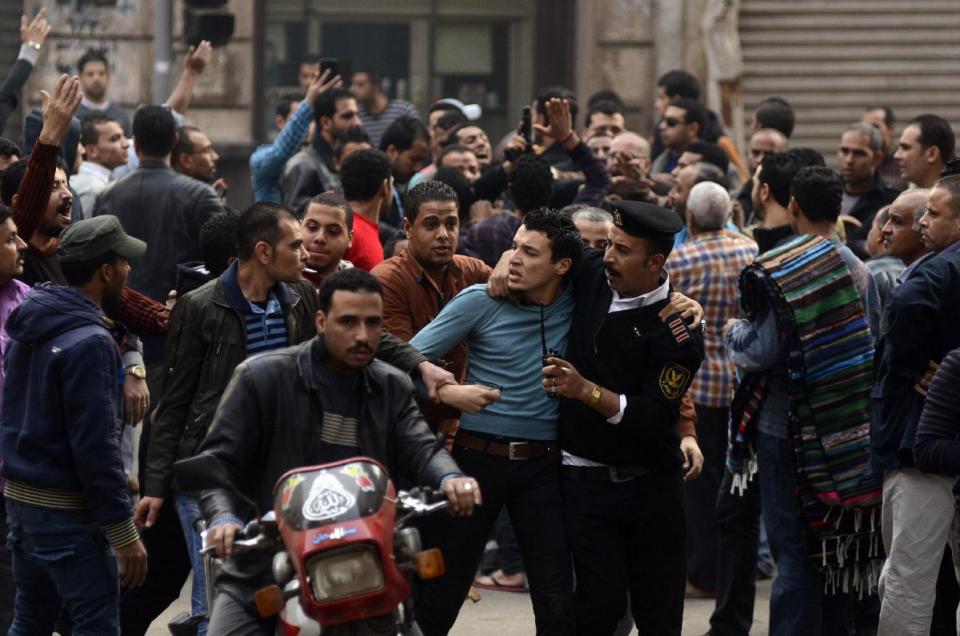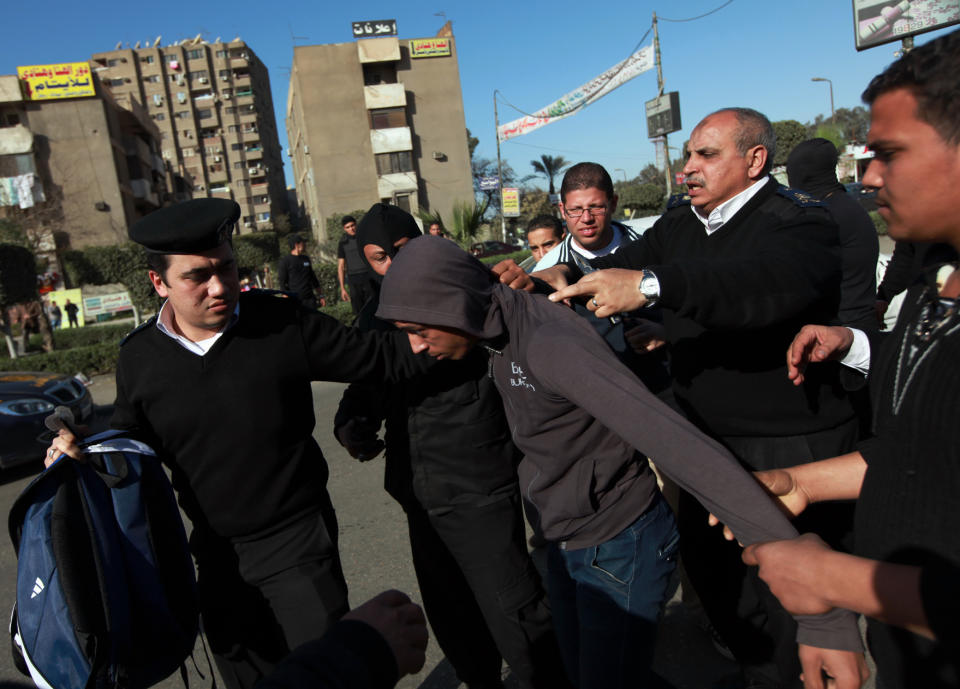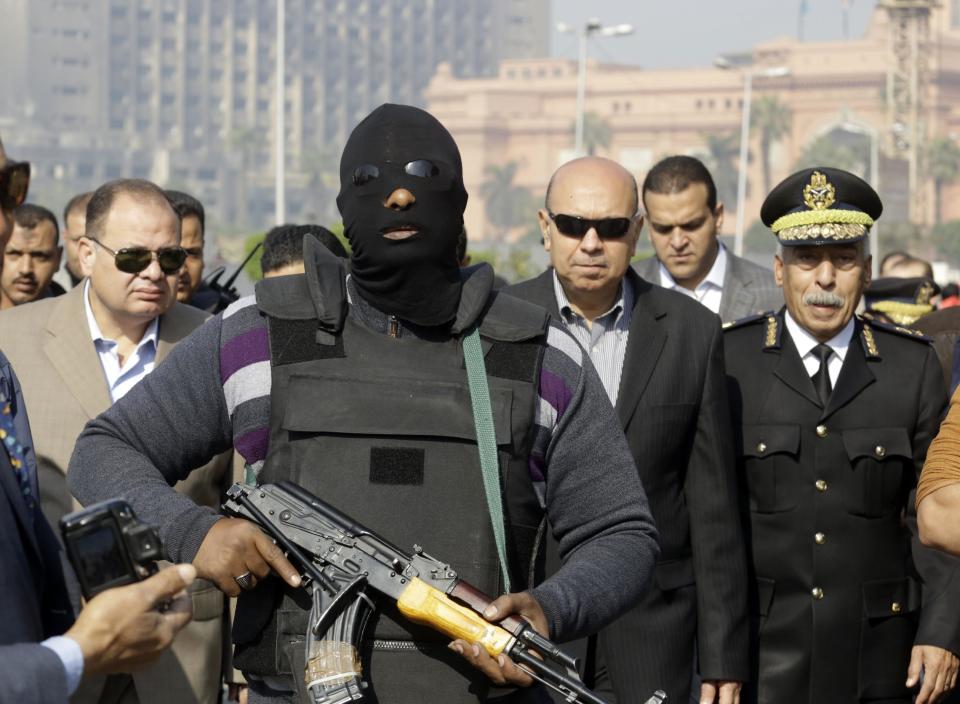3 years after Mubarak, reports of abuses in Egypt
CAIRO (AP) — On the third anniversary of the day Hosni Mubarak stepped down as Egypt's president after an 18-day uprising, the government blocked access to Tahrir Square on Tuesday and letters emerged from activists reporting that they have been beaten and subjected to other abuses by police after being arrested in a string of protests in late January.
The anniversary took place amid a somber mood in Egypt. Human rights groups denounced what they say are new cases of torture, and warned against a silencing of dissent. The new military-backed government says it is fighting a deadly upsurge in Islamic militant violence.
The night of Feb. 11, 2011, Tahrir Square, where the uprising was born, was a scene of euphoria with fireworks exploding and crowds dancing and weeping with joy after the TV announcement of Mubarak's ouster.
On Tuesday, there were no official celebrations for the anniversary and the large plaza in downtown Cairo was sealed off by security forces to prevent gatherings, with even pedestrians barred from entry. It has become a no-go zone for any rallies except for ones showing support for the military after its ouster last summer of Islamist Mohammed Morsi, who after Mubarak's fall became Egypt's first freely elected president only to see millions join protests demanding his removal for abusing power.
Sealing one entrance was a new, large metal gate erected to block access to and from the square to a main avenue where parliament and several government ministry buildings are located. The gate, about 3 meters (10 feet) tall with spikes on the top and painted the red-black-and-white colors of the Egyptian flag, replaces a more obstructive barrier — a doorless wall of cement blocks that had been blocking the avenue for more than a year because of repeated protests.
Other entrances to the square Tuesday were closed by coils of barbed wire and armored vehicles.
Since Morsi's removal on July 3, the military-backed government has cracked down on the Muslim Brotherhood and other Islamists, who have continued protests demanding Morsi's reinstatement. Violence has escalated, with hundreds of protesters killed in clashes with police and thousands arrested. At the same time, Islamic militants have stepped up a campaign of bombings and assassinations that have killed dozens of soldiers and police as well as some civilians.
The crackdown has extended to silence other, secular voices critical of the new government. Several of the most well-known secular activists who led the 2011 revolt against Mubarak have been imprisoned on charges of breaking a draconian new law banning protests without police permission.
More activists were arrested on Jan. 25, when they tried to hold anti-government protests on the third anniversary of the start of the anti-Mubarak uprising. The same day also saw marches by Islamists that turned into widespread clashes with police, leaving at least 49 Islamists dead, according to official figures — though accounts by human rights groups put the number as high as 100.
Recent days have seen a string of reports of police abuses of those detained 18 days ago.
The Interior Ministry, which is in charge of police, said in a statement Tuesday that claims of police torture and abuse "are not true." It said the culture of police has changed and they are more determined to abide by human rights standards, adding that the ministry is ready to investigate any complaints.
Gen. Abu Bakr Abdel-Karim, the assistant interior minister for human rights, told independent ONTV on Tuesday that he is aware of one of the abuse report from one detainee, Khaled el-Sayyed, and that he should file a complaint to the prosecutor general to open investigation.
In a letter posted Monday on an activist news website, el-Sayed, a secular activist who was arrested while participating in a Jan. 25 protest, wrote that the Cairo police station where he was first taken was "a slaughterhouse where torture parties are going on." He said he was beaten and taken blindfolded into a room where other detainees were being tortured.
"From their screams, I knew they were being given electric shocks," he wrote in the letter, posted Monday on January Gate, an activist news website. Detainees later told him about the electric shocks and others told him they were forced to stand for 16 hours then beaten by guards when they collapsed.
He wrote that he was later taken to the Abu Zaabal prison in Cairo, where he was stripped and sprayed with cold water. Every day, he and other detainees undergo a "good morning" ritual in which their hands are bound tightly behind their backs and they are beaten, he wrote.
In another letter, Karim el-Behiri, a journalist with the independent Al-Badil daily, wrote that he was detained while covering the Jan. 25 protests. He said he was beaten with truncheons by police and piled into a truck packed with young men, and then taken to a police station where police told him to pose for pictures with weapons and molotov cocktails. When he refused, he was beaten again, el-Behiri wrote.
The letter, dated Jan. 29, was published last week in el-Beheiri's newspaper, Al-Badil, which said it was from him, though it did not detail how it was smuggled out of prison. The AP could not independently confirm its authenticity.
El-Behiri wrote that he was being held in a camp of the Central Security riot police forces, where he and other detainees were forced to face a wall, strip to their underwear and then were beaten for a half hour before being put in a cell. The cell had a capacity of about 20 people but was packed with 71 detainees, he said. The next day, when he was questioned by a prosecutor, he reported the abuse, but was handed a 15-day renewal of his detention for investigations.
"What I have seen in this camp is disastrous," he wrote. "It is an illegal detention camp, brutal torture is practiced."
Activist and blogger Amr Medhat recounted his arrest on the webpage of the Al-Shorouk newspaper on Friday. He said he was detained at dawn on Jan. 25, when police stopped him at a checkpoint and found posters in his car calling for a "no" vote against the military-backed constitution, passed in a December referendum. Though he is not a Brotherhood supporter, he was accused of being one since the group opposed the constitution.
In detention, he said he witnessed guards giving incoming detainees what they called "the honorary welcome" — beating their heads against walls and cell doors.
In a report Tuesday, a prominent Egyptian rights group, the Arab Network for Human Rights Information, denounced "flagrant torture practices worse than those practiced ... during the worst dictatorships that Egypt witnessed" and called on authorities to investigate the testimonies of abuses. It said detainees have been subjected to "systematic torture" by security forces.
Amnesty International researcher Diana Eltahawy said she had gathered accounts of detainees who were beaten with sticks and given electric shocks in police stations, though she said abuses generally do not continue when detainees are taken to official prisons.
The "circle of repression has widened," she told The Associated Press. "The effect is sending a sign that dissent in any form including peaceful dissent will not be tolerated."
___
AP writer Laura Dean contributed to this report.




